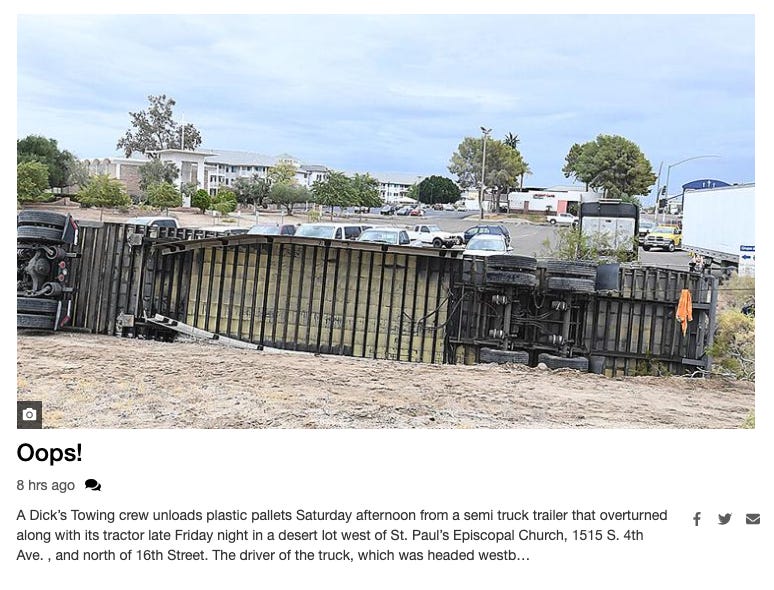
The Daily Agenda: The in crowd becomes the out crowd
There's a new set of kingmakers in town ... The subpoenas just keep coming ... And we love local headline writers.
Our days without a paywall of some kind are numbered, but our sale is still in full swing because we don’t want you to miss out on anything.
Instead of our usual $120 annual price, you’ll pay $84, a discount of 30%. That’s only $7 per month, or 23 cents a day. Look at us mathing!
Sign up now to make sure you stay up to date on Arizona politics, so you can hold your elected officials accountable in the new year.
With Democrats freshly in control of nearly every statewide office and massive turnover in the Legislature, the power dynamics at the Capitol are rapidly changing.
Many of the old power brokers are on the outs, and a new class of influencers will have an opportunity to prove they can enact policy in the newly purple state. Holding the Republican caucus together is no longer the go-to play. The mandate from the Governor’s Office is a bipartisan policy agenda, and in a split government, building a coalition is key.
Sure, the Legislature is still full of MAGA warriors. Warren Petersen is leading the state Senate, and Sen. Wendy Rogers and her ilk mostly run the Legislature’s most powerful committees. But if you're a lobbyist looking to pass bills at the Capitol next year, you’re probably not asking “Freedom Caucus” leader Rep. Jake Hoffman to sponsor them.
The Republican firebrands who have largely set the tone and direction of the state Legislature are on the outs, as are their friends in the lobbying class.
Yes, we’ve used this meme before, but it’s perfect.
Instead, Capitol lobbyists say they’re looking at moderate Republicans and, for the first time in more than a decade, Democrats, to help push their policy priorities through the legislative process.
The same politicians who were preparing for four years on the back bench under a Kari Lake governorship are now seeing their political fortunes skyrocket. A month ago, for example, Republican Sen. T.J. Shope was blocked on Twitter by the potential next governor. Today, he’s almost universally considered one of the Capitol’s most influential leaders, several lobbyists said.
“T.J. Shope will have to run all the bills,” one lobbyist joked.
The ranks of moderate Republicans have been decimated in recent years. But we may for the first time see the “moderate caucus” grow, or at least see an increasing number of Republican lawmakers crossing the aisle to work with Democrats to pass shared priorities out of necessity or self-preservation.
Keep an eye on Republican lawmakers from swing districts1, like Reps. Justin Wilmeth and Matt Gress, and Sens. Steve Kaiser, Shope and J.D. Mesnard. Political insiders also point to a handful of Republicans with independent streaks, like Reps. Ken Bennett and David Cook and Sen. Sine Kerr, or a willingness to cut deals, like Sen. David Gowan, as the type that will thrive in a divided government.
And legislative Democrats, with their former colleague now on the Ninth Floor, are a more powerful force than they have been in more than a decade. While individual Democrats are sure to shine under a Democratic governorship, the Democratic leaders in both caucuses will now wield nearly as much power as their Republican counterparts. Senate Democratic Leader Raquel Terán and House Democratic Leader Andrés Cano, working with the Governor’s Office, will likely drive the state budget process, for example, not Republicans.
But it’s not just the politicians whose influences are waxing or waning. The lobbying class will change as well. While many of the old-timers were savvy enough to not make personal enemies with either candidate, others put all their eggs in the Lake basket.
Those in the lobbying and consulting corps who offered their full-throated backing of losing America First candidates could see their fortunes flop, like their candidates. Lobbyists like Spencer Kamps of the Homebuilders’ Association of Central Arizona, Bas Aja of the Cattlemen’s Association, Danny Seiden of the Arizona Chamber of Commerce and Industry and Patrick Bray of the Arizona Farm and Ranch Group were all major Lake supporters who were rumored to be among possible picks for her administration.
Instead, the political power center of Arizona is now built around centrist Democrats like lobbyist Mike Haener, the co-chair of her transition team who has been a staple in state government and policy since the Janet Napolitano administration; Chad Campbell of Lumen Strategies2, a former lawmaker and longtime Hobbs friend and ally; and Joe Wolf, Hobbs’ top campaign adviser, as well as a few Republicans who stuck by Hobbs through the campaign.
Perhaps the biggest question is where Arizona’s progressive infrastructure fits into the Hobbs machine. What kind of influence groups like LUCHA, Progress Arizona and unions that supported Hobbs will have on the governor’s agenda, and will they ultimately work as friend or foe to her generally center-left administration? On that front, one lobbyist warned that while progressives will certainly have their best opportunity for wins in years, similar to far-right Republicans, progressives focused on controversial issues should stay sober about what’s possible, even under a Democratic governor.
“It’s still a Republican Legislature,” the lobbyist said.
More subpoenas: Elections officials in Maricopa County and two other states received subpoenas seeking records of their communication with Trump and his team regarding the 2020 election as part of the Justice Department’s investigation, the Washington Post reports. Maricopa County’s spokesman said the county will comply with the subpoena.
A real Pandora’s box: Gov. Doug Ducey said he did promise lawmakers he’d call a special session to increase the school spending limit if they could get the votes, but now that they appear to have the votes, he said he won’t call one unless they agree to also address some of his own priorities, though he wouldn’t say which ones specifically, Capitol Media Services’ Howie Fischer reports. His staff later said those priorities could include increasing voucher funds, border issues or election law. The Republic’s Mary Jo Pitzl has more details on what the voucher increases could be and the election law Ducey wants to discuss. The election proposal would make mandatory a newly passed state law that gave counties the option to feed mail-in ballots into tabulators on Election Day instead of dropping them off. Maricopa County Recorder Stephen Richer isn’t a fan of the idea.
Not going quietly: U.S. Rep. Andy Biggs, who we are obligated to tell you once won $10 million from a 1990’s sweepstakes, said yesterday that he’s still running for U.S. House speaker, challenging Kevin McCarthy for the role. Though Biggs lost handily when Republicans voted amongst themselves for the position last month, McCarthy still needs to get 218 votes from the full House to take the role. Biggs’ entry into the race could spoil McCarthy’s ability to get the needed votes, leaving the speaker’s race in disarray.


Chips, not borders: President Joe Biden was in town yesterday at the Taiwan Semiconductor Manufacturing Company, which announced it will expand its Arizona factory that produces computer chips. The visit highlighted the CHIPS Act, a recently approved package of subsidies and enticements for American-made chips. Biden didn’t tack on a border visit to his stop in Arizona, telling Fox News that “there are more important things going on. They’re going to invest billions of dollars in a new enterprise."
The TweetGate that wasn’t: The Arizona Secretary of State’s Office asked Twitter to remove two tweets on Jan. 7, 2021, because they “falsely suggested that the state's voter registration database was controlled by a foreign entity,” Axios Phoenix’s Jeremy Duda reports. The right has latched onto the removal, with the AZGOP claiming it constitutes a “bombshell” that suppressed free speech and meant Gov.-elect Katie Hobbs was trying to influence her own election.
Counterproductive: Students who frequently miss or come late to class are often punished with suspension, making them miss more class, further disrupting their education. In some Arizona school districts, more than half of in-school suspensions stem from attendance issues, a new analysis from the Arizona Center for Investigative Reporting and the Hechinger Report found. Some districts’ data showed that Black and Hispanic students made up a “disproportionate share” of such suspensions.
Do something, UArizona: Kathleen Meixner, the wife of slain University of Arizona professor Thomas Meixner, wrote an op-ed in the Arizona Daily Star, challenging the university to investigate and respond to the circumstances that put Meixner and his colleagues under threat and in fear of a former student. The university has faced scrutiny since the murder from staff and students who said their reports of threats were not taken seriously.
“Tom believed in the institution of the University of Arizona, and it is with great optimism, that I implore the University of Arizona to be a model in its response to Tom’s murder, by taking care of the people who Tom loved so much,” Kathleen Meixner wrote.
A crisis within a crisis: A Washington Post story that looks at student mental health declines since the pandemic centers in Chandler, where some students have faced depression and anxiety, leading a few to die by suicide. The paper says that the already-high levels of depression and anxiety among teens “surged amid the isolation, disruption and hardship of covid-19.”
Arizona got California-ed: A young woman who left the Bay Area of California because of high prices moved to Prescott Valley, only to find that housing costs were high and wages low here, she told Marketplace. She commuted from Prescott Valley to Phoenix to work and did food delivery after her day job, still only making enough to pay rent.
Speaking of the cost of rent, we really appreciate your financial support! Another way you can help the Agenda grow is to share it with friends. Luckily, we have a button for that.
Unprecedented: Voters on the Navajo Nation elected 10 women to leadership positions, including the vice presidency, “giving women a stronger voice in tribal leadership,” the Republic’s Arlyssa Becenti reports.


Achievement unlocked: Sierra Vista elected its first Black mayor, Clea McCaa. He told his high school coach that he’d be the mayor one day, and finally achieved his lifelong dream, Arizona Public Media’s Summer Hom reports.
We’ve previously written about how much we love the creativity of the headline writers at Arizona’s small newspapers. This headline from a Yuma Sun article this week really captured both simplicity and urgency in a way we envy. Sometimes, “Oops!” is all you really need to say.
The theory that purple districts will send the Legislature its moderates isn’t universally true: Rep. Liz Harris, representing the split LD13, has already pledged to not vote for any legislation until there’s a do-over of the 2022 election.
Correction: A previous version of this piece listed Campbell as still at his old firm.













Since it seems like Ducey is breaking a promise he made to the Dems to get his budget passed in the last session, if I'm the Dems I'd tell him to screw off and wait until the new governor and legislature take office. If he can get his "priorities" through the current legislature in a special session with only R support, then have at it. Irritating & risky to postpone school funding, but that's what I'd do. Unfortunately, no one has asked me!
Re: Liz Harris - perhaps other MAGA legislators will follow her lead, in effect giving the Dems the majority